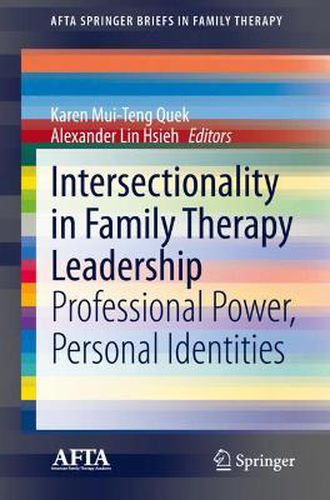Readings Newsletter
Become a Readings Member to make your shopping experience even easier.
Sign in or sign up for free!
You’re not far away from qualifying for FREE standard shipping within Australia
You’ve qualified for FREE standard shipping within Australia
The cart is loading…






This title is printed to order. This book may have been self-published. If so, we cannot guarantee the quality of the content. In the main most books will have gone through the editing process however some may not. We therefore suggest that you be aware of this before ordering this book. If in doubt check either the author or publisher’s details as we are unable to accept any returns unless they are faulty. Please contact us if you have any questions.
This brief examines the ways in which sociocultural characteristics and contexts intersect to create varying dimensions of social advantage and inequality that, in turn, affect and organize professional relationships in educational and therapeutic settings. It explores how inherently hierarchical relationships develop within educational and university contexts, including between professors and students, supervisors and supervisees, clinicians and clients, and administrators and faculty members. The volume addresses how participants’ social locations inform their roles and actions and how they can hold positions of power while also embodying a marginalized identities.In addition, the book draws on perspectives of persons marginalized or privileged based on their race/ethnicity, sexual orientation, and/or gender to examine how social location impacts their work as family therapy clinicians, supervisors, instructors, and administrators. Grounded in individual reflection and detailed experiences, each chapter describes rich personal narrative on how the individual therapist’s intersecting social locations influence his/her professional relationships. This book highlights the need for family therapists to identify their social location characteristics, evaluate the impact of their social location on their professional relationships, and process the role social location has on their academic, supervisory and clinical position. This volume is an essential resource for clinicians and practitioners, researchers and professors, and graduate students in family studies, clinical psychology, and public health as well as all interrelated disciplines.
$9.00 standard shipping within Australia
FREE standard shipping within Australia for orders over $100.00
Express & International shipping calculated at checkout
This title is printed to order. This book may have been self-published. If so, we cannot guarantee the quality of the content. In the main most books will have gone through the editing process however some may not. We therefore suggest that you be aware of this before ordering this book. If in doubt check either the author or publisher’s details as we are unable to accept any returns unless they are faulty. Please contact us if you have any questions.
This brief examines the ways in which sociocultural characteristics and contexts intersect to create varying dimensions of social advantage and inequality that, in turn, affect and organize professional relationships in educational and therapeutic settings. It explores how inherently hierarchical relationships develop within educational and university contexts, including between professors and students, supervisors and supervisees, clinicians and clients, and administrators and faculty members. The volume addresses how participants’ social locations inform their roles and actions and how they can hold positions of power while also embodying a marginalized identities.In addition, the book draws on perspectives of persons marginalized or privileged based on their race/ethnicity, sexual orientation, and/or gender to examine how social location impacts their work as family therapy clinicians, supervisors, instructors, and administrators. Grounded in individual reflection and detailed experiences, each chapter describes rich personal narrative on how the individual therapist’s intersecting social locations influence his/her professional relationships. This book highlights the need for family therapists to identify their social location characteristics, evaluate the impact of their social location on their professional relationships, and process the role social location has on their academic, supervisory and clinical position. This volume is an essential resource for clinicians and practitioners, researchers and professors, and graduate students in family studies, clinical psychology, and public health as well as all interrelated disciplines.